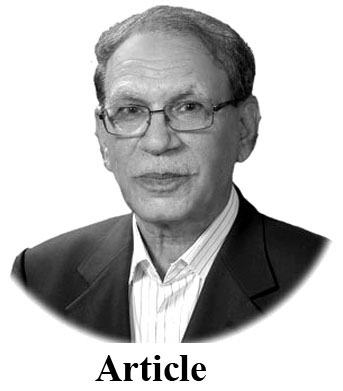Mohammad Jamil
RUMORS are rife that change of federal government and Punjab government is being considered by, what they call power brokers meaning military establishment. According to rumor mongerers, Shebaz Sharif and Pervez Ilahi are being tipped as prime minister of Pakistan and chief minister of Punjab respectively. Umar Cheema, an investigative journalist, in his recently published article in a national English daily captioned ‘PML-N negotiates power with power brokers but far from conclusion’ stated that according to a formula for change the national government is considered an option with major parties having representation in it. One can conclude from the caption that his source is PML-N, and this desk story has been prompted by the PML-N leadership and section of bureaucracy with a view to giving hope to its members to stay with the party. Of course, the vested interests that are against the change are behind this propaganda campaign.
Referring to the parleys between PML-N leaders and power brokers, the author wrote: “As the party is negotiating power with the power-brokers, there are parallel proposals under consideration… An important official flew to London two months ago for negotiation, as governance is going from bad to worse. Several options came under deliberation. Whether there should be changes at some level or going straight to the next election is a solution, are two major options”? According to him, Shahbaz Sharif is said to have promised to reply to the power brokers after holding consultation with Nawaz Sharif. Military through ISPR has many a time made it clear that it supports the government’s policies, which is in line with the stipulations of the Constitution. Of course, civil-military relationship is ideal since the formation of PTI government, which cannot be digested by anti-establishment elements.
The author also concocted a story that “efforts are afoot to launch a new party sans Sharifs and Chaudhrys of Gujrat. Several old Muslim Leaguers have been interviewed for the purpose. Nevertheless, it is not known what the alternative plan is in the mind of the power brokers this time”. The story of formation of new party appears to be figment of his imagination. It is true that PTI’s government is under pressure because of increase in electricity and gas tariffs, and also increase in discount rate to meet the conditionalities of the IMF, which has cumulative effect on industry and the people in general. The fact remains that opposition parties are in disarray, and they cannot build up a movement against the government. However, there is a possibility that in the event government fails to rein in inflation, people at their own may come out on the streets.
PTI’s allies are worried about that scenario; however they want to blackmail the government to have larger piece of cake. Recently, PML-Q, MQM, GDA and BNP (Akhtar Mengal) have expressed dissatisfaction over failure of the government to honour its commitments. PML-Q leadership says that it supported the PTI unconditionally, yet it demands of the PTI to honour the commitments made by it. What is happening is nothing new so far as Pakistan is concerned. Perpetual political upheavals, the wheeling and dealing of elected members of Parliament for personal gains, perks and privileges of power, making majority party hostage to a minority party are to name the few of some demerits of parliamentary system. In the 1990s, Mr. Manzoor Wattoo with only 17 members out of 240 members had manoeuvred to get himself elected as the Chief Minister of Punjab because the PPP did not have adequate numbers to form government in Punjab.
Anyhow, smaller parties are in a position to bargain with or blackmail the major parties, as is obvious by the pressure tactics of the MQM, PML-Q and other allies. Perhaps, PTI had promised too much to elicit their support to form government in the centre and Punjab. In parliamentary democracy, even when a party gains a clear majority, the government is susceptible to splits and defections, necessitating re-alignments or re-elections. Even in the entrenched democracy like England, the way Margaret Thatcher was changed midway of her tenure by the ruling party was a case in point. In Pakistan from 1947 to 1958, at least seven prime ministers took oath and none of them completed the tenure. Similarly, from 1988 to 1999, the PPP and Muslim League twice came to power, but were sent packing under 58-2(b) when the opposition parties formed alliances to get rid of the elected governments.
The problem is that it is a sham democracy, as there is nothing for the masses. The education, health and environment sectors had become a picture of bad governance during the last two tenures of previous governments. Majority of the people are living in the gloom of stalking poverty, squalor, want and deprivation for over seven decades due to loot and plunder by the ruling elite. Economic disparity, socio-economic injustice, rampant corruption, rising crime rate and ineffective criminal justice system especially in lower courts, are the challenges facing the government that must be met. If measures are not taken to improve the life of the teeming millions, the rulers could meet wrath of the people. Imran Khan, therefore, must find ways and means to give relief to the masses by controlling prices of essential items of daily use, and also stop any further increase in electricity and gas. There is widespread perception that there is no threat to PTI from the opposition, but from inflation and joblessness. Having that said, entire credit goes to Imran Khan for making a dent in dynastic politics of major political parties, as their leaders are either absconders, or on bail or in jail.
—The writer is a senior journalist based in Lahore.










